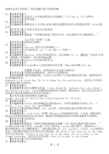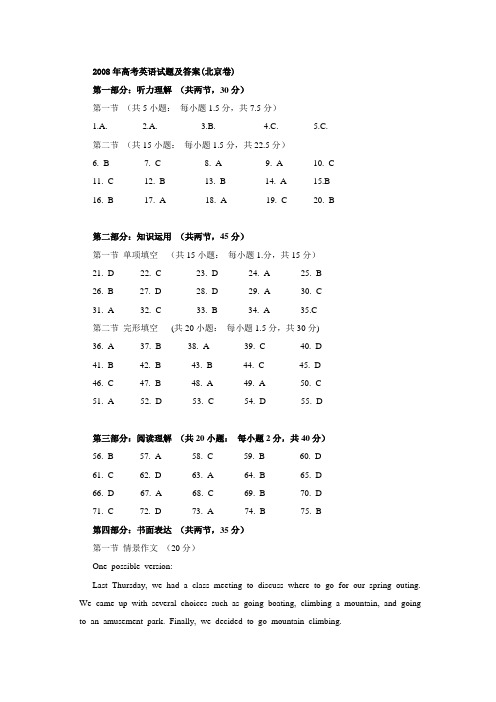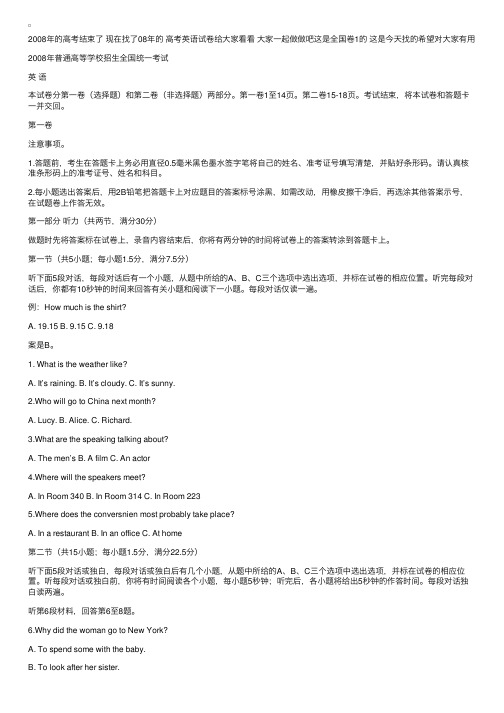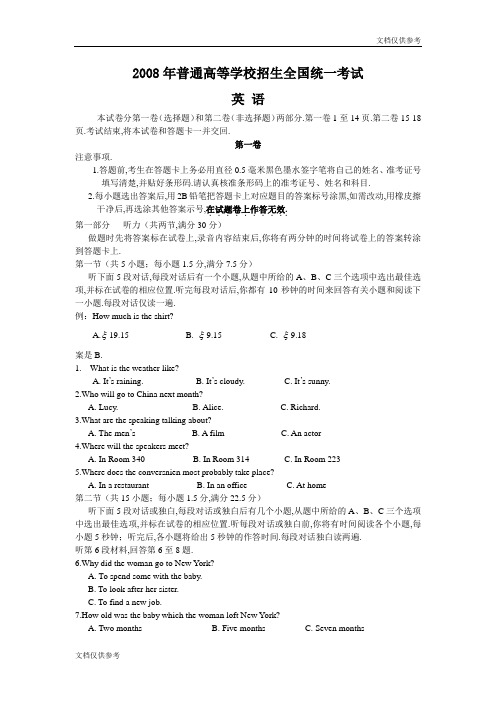B专家点评2008年高考英语试题北京卷 B
2008年高考(全国卷Ⅰ)英语试题分析与答案详解

【备考提示】面对这种句式结构较复杂的句子,首先要抓主干。如果spoken前有is,则B项也成立。
34.【标准答案】C。
【试题解析】set out动身,出发,开始干;take over接管;take up从事;set up建立,成立。题意是“在一所医学院学了五年后,Jane在乡下从事医生这项工作。”
56.【标准答案】D。
【试题解析】从文章第二段He seemed unhappy with me unless I got straight A’s and unhappy with my boyfriends if their fathers were not as “successful” as he was.可知作者父亲以前对她要求很严格。如果自己成绩不好,或者男朋友们的父亲不和他一样“成功”,他就不高兴。
【高考考点】形容词词义辨析。
53.【标准答案】B。
【试题解析】从该句前部分I wanted to get into a hole可知自己当时因遇而真想找个洞藏起来,故选B项。其余选项与语意不符。
【高考考点】动词词义辨析。
54.【标准答案】D。
【试题解析】repeat重说;discover发现;correct改正;describe。纵观全文,作者在描述她以前亲身经历的尴尬的事情,故选D。
【高考考点】动词词义辨析。
43.【标准答案】D。
【试题解析】从空后的内容可知,当时看到的托盘与培训的不一样,有一个漂亮的手柄,很好使,所以感到很高兴。
【高考考点】形容词词义辨析。
44.【标准答案】B。
【试题解析】fix安装;train接受训练;load装载;wait等候。正式上岗前要经过学习培训,所以答案应为选项B。
2008年高考英语试题及答案(北京卷)

2008年高考英语试题及答案(北京卷)第一部分:听力理解(共两节,30分)第一节(共5小题:每小题1.5分,共7.5分)1.A.2.A.3.B.4.C.5.C.第二节(共15小题:每小题1.5分,共22.5分)6. B7. C8. A9. A 10. C11. C 12. B 13. B 14. A 15.B16. B 17. A 18. A 19. C 20. B第二部分:知识运用(共两节,45分)第一节单项填空(共15小题:每小题1.分,共15分)21. D 22. C 23. D 24. A 25. B26. B 27. D 28. D 29. A 30. C31. A 32. C 33. B 34. A 35.C第二节完形填空(共20小题:每小题1.5分,共30分)36. A 37. B 38. A 39. C 40. D41. B 42. B 43. B 44. C 45. D46. C 47. B 48. A 49. A 50. C51. A 52. D 53. C 54. D 55. D第三部分:阅读理解(共20小题:每小题2分,共40分)56. B 57. A 58. C 59. B 60. D61. C 62. D 63. A 64. B 65. D66. D 67. A 68. C 69. B 70. D71. C 72. D 73. A 74. B 75. B第四部分:书面表达(共两节,35分)第一节情景作文(20分)One possible version:Last Thursday, we had a class meeting to discuss where to go for our spring outing. We came up with several choices such as going boating, climbing a mountain, and going to an amusement park. Finally, we decided to go mountain climbing.The next day, we set off early in the morning. While climbing the mountain, we enj oyed the warm sunshine and a beautiful view. However, when reached the top, we were s hocked to see litter here and there, such as bottles and banana peels. Then we started to pick up the litter. Afterwards, we put the rubbish into the nearby recycling bin and non-re cycling bin respectively.We were tired but happy.第二节开放作文(15分)One possible version: (from )From the picture I can see a pair of proud compasses and a hard-working pencil. Th e compasses are big, drawing a circle with ease, while the pencil is small, drawing a line with great effort. I think the compasses are reasonable to be proud because no one else can do the job better. At the same time, however, he should realize the pencil has his o wn advantages. The pencil can do other shapes better than the compasses, even pictures. So in my opinion, while we are confident in ourselves, we should recognize strengths in others and show due respect for them.。
2008年高考英语试题及答案

2008年的⾼考结束了现在找了08年的⾼考英语试卷给⼤家看看⼤家⼀起做做吧这是全国卷1的这是今天找的希望对⼤家有⽤2008年普通⾼等学校招⽣全国统⼀考试英语本试卷分第⼀卷(选择题)和第⼆卷(⾮选择题)两部分。
第⼀卷1⾄14页。
第⼆卷15-18页。
考试结束,将本试卷和答题卡⼀并交回。
第⼀卷注意事项。
1.答题前,考⽣在答题卡上务必⽤直径0.5毫⽶⿊⾊墨⽔签字笔将⾃⼰的姓名、准考证号填写清楚,并贴好条形码。
请认真核准条形码上的准考证号、姓名和科⽬。
2.每⼩题选出答案后,⽤2B铅笔把答题卡上对应题⽬的答案标号涂⿊,如需改动,⽤橡⽪擦⼲净后,再选涂其他答案⽰号,在试题卷上作答⽆效。
第⼀部分听⼒(共两节,满分30分)做题时先将答案标在试卷上,录⾳内容结束后,你将有两分钟的时间将试卷上的答案转涂到答题卡上。
第⼀节(共5⼩题;每⼩题1.5分,满分7.5分)听下⾯5段对话,每段对话后有⼀个⼩题,从题中所给的A、B、C三个选项中选出选项,并标在试卷的相应位置。
听完每段对话后,你都有10秒钟的时间来回答有关⼩题和阅读下⼀⼩题。
每段对话仅读⼀遍。
例:How much is the shirt?A. 19.15B. 9.15C. 9.18案是B。
1. What is the weather like?A. It’s raining.B. It’s cloudy.C. It’s sunny.2.Who will go to China next month?A. Lucy.B. Alice.C. Richard.3.What are the speaking talking about?A. The men’sB. A filmC. An actor4.Where will the speakers meet?A. In Room 340B. In Room 314C. In Room 2235.Where does the conversnien most probably take place?A. In a restaurantB. In an officeC. At home第⼆节(共15⼩题;每⼩题1.5分,满分22.5分)听下⾯5段对话或独⽩,每段对话或独⽩后有⼏个⼩题,从题中所给的A、B、C三个选项中选出选项,并标在试卷的相应位置。
2008年高考新课标全国英语试卷解析(原卷版)

2008年普通高等学校招生全国统一考试英语本试卷分第一卷(选择题)和第二卷(非选择题)两部分.第一卷1至14页.第二卷15-18页.考试结束,将本试卷和答题卡一并交回.第一卷注意事项.1.答题前,考生在答题卡上务必用直径0.5毫米黑色墨水签字笔将自己的姓名、准考证号填写清楚,并贴好条形码.请认真核准条形码上的准考证号、姓名和科目.2.每小题选出答案后,用2B铅笔把答题卡上对应题目的答案标号涂黑,如需改动,用橡皮擦干净后,再选涂其他答案示号,在试题卷上作答无效...........第一部分听力(共两节,满分30分)做题时先将答案标在试卷上,录音内容结束后,你将有两分钟的时间将试卷上的答案转涂到答题卡上.第一节(共5小题;每小题1.5分,满分7.5分)听下面5段对话,每段对话后有一个小题,从题中所给的A、B、C三个选项中选出最佳选项,并标在试卷的相应位置.听完每段对话后,你都有10秒钟的时间来回答有关小题和阅读下一小题.每段对话仅读一遍.例:How much is the shirt?A.ξ19.15B. ξ9.15C. ξ9.18案是B.1.What is the weather like?A. It’s raining.B. It’s cloudy.C. It’s sunny.2.Who will go to China next month?A. Lucy.B. Alice.C. Richard.3.What are the speaking talking about?A. The men’sB. A filmC. An actor4.Where will the speakers meet?A. In Room 340B. In Room 314C. In Room 2235.Where does the conversnien most probably take place?A. In a restaurantB. In an officeC. At home第二节(共15小题;每小题1.5分,满分22.5分)听下面5段对话或独白,每段对话或独白后有几个小题,从题中所给的A、B、C三个选项中选出最佳选项,并标在试卷的相应位置.听每段对话或独白前,你将有时间阅读各个小题,每小题5秒钟;听完后,各小题将给出5秒钟的作答时间.每段对话独白读两遍.听第6段材料,回答第6至8题.6.Why did the woman go to New York?A. To spend some with the baby.B. To look after her sister.C. To find a new job.7.How old was the baby which the woman loft New York?A. Two monthsB. Five monthsC. Seven months8.What did the woman like doing most with the baby?A. Holding himB. Playing with himC. Feeding him听第7段材料,回答第9至11题.9.Whet are the speakers talking about?A.A way to improve air qualityB.A problem with traffic rulesC.A suggestion for city planning10.What does the man suggest?A. Limiting the use of carsB. Encouraging people to walkC. Warning drivers of air pollution11.What does woman think about the man’s idea?A. It’s interestingB. It’s worth tryingC. It’ s impractical听第8段材料,回答第12至14题.12.How long will the man probably stay in New Zealand?A. One weekB. Two weeksC. Three weeks13.What advice does the woman give to the man?A. Go to New Zealand after ChristmasB. Book his flight as soon as possibleC. Save more money for his trip14.What can we learn about flights to New Zealand at Christmas time?A. They require early bookingB. They can be twice as expensiveC. They are on special offer听第9段材料,回答第15至17题.15.Why did Jane call Mike?A. To ask him to meet herB. To tell him about TomC. To borrow his car16.Where will Jane be in about home?A. At Mike’s placeB. At the airportC. At a garage17.What can we infer from the conversation?A. Jane has just learned to driveB. Jane’s car is in bad conditionC. Mike will go to the airport听第10段材料,回答第18至20题.18.What did the speaker ask the students to do the week before?A. Write a short storyB. Prepare for the lessonC. Learn more about writer19.Why does the speaker ask the questions?A. To check the students’ understanding of the storyB. To draw the students; attention to reading skillsC. To let the students discuss father-son relationships20.What will the students do in 10 minutes?A. Ask more questionsB. Discuss in groupsC. Give their answers第二部分英语知识运用(共两节,满分45分)第一节单项填空(共15小题;每小题1分,满分15分)从A、B、C、D四个选项中,选出可以填入空白处的最佳选项,并在答题卡上将该项涂黑. 例:We last night, but we went to the concert instead.A. must have studiedB. might studyC. should have studiedD. would study21.—Would you like to join me for a quick lunch before class?—, but I promised Nancy to go out with her.A. I’d like toB. I like itC. I don’tD. I will22. —What fruit is in season now?—Pears and apples,A.I knowB.I thinkC.I seeD.I feel23.The performance nearly three hours, but few people left the theatre early.A. coveredB. reachedC. playedD. lasted24.Let’s learn to use the problem we are facing a stepping-stone to future success.A. toB. forC. asD. by25.The lawyer seldom wears anything other than a suit the season.A. whateverB. whereverC. wheneverD. however26.I like getting up very early in summer. The morning are is so good .A. to be breathedB. to breatheC. breathingD. being breathed27. —Have you known Dr. Jackson for a long time?—Yes, since she the Chinese Society.A. has joinedB. joinsC. had joinedD. joined28.You’re driving too fast. Can you drive ?A. more slowly a bitB. slowly a bit moreC. a bit more slowlyD. slowly more a bit29.The wet weather will continue tomorrow when a cold front to arrive.A. is expectedB. is expectingC. expectsD. will be expected30. —Which of the two computer games did you prefer?—Actually I didn’t like .A. both of themB. either of themC. none of themD. neither of them31. —Have you got any idea for the summer vacation?—I don’t mind where we go there’s sun sea and beach.A. as ifB. as long asC. now thatD. in order that32.The weather was cold that I didn’t like to leave my room.A. reallyB. suchC. tooD. so33.The English spoken in the United States is only slightly different from spoken inEnglandA. whichB. whatC. thatD. the one34.After studying in a medical college for five years, Jane her job as a doctor inthe countryside.A. set outB. took overC. took upD. set up35. —Sorry, I made a mistake again.—. .Practice more and you ‘ II succeed.A. Never mindB. Certainly notC. Not at allD. Don’t mention it第二节完形填空(共20小题;每小题1.5,满分30分)阅读下面短文,从短文后各题所给的四个选项(A、B、C和D)出可以填入空白的最佳选项,并在答题卡上将该项涂黑.After the birth of my second child, I got a job at a restaurant. Having worked with an experienced 36 for a few days, I was 37 to wait tables on my own. All went 38 that first week. When Saturday night came, I was luckily 39 the tables not far from the kitchen 40 ,I still felt it a little hard to carry the heavy trays (托盘).Before I knew it, the 41 was full of people, I moved slowly 42 , every step.I remember how 43 I was when I saw the tray stand net the tables, it looked different from the one I was 44 on, It had nice handles(手柄),which made it 45 to move around. I was pleased with everything and began to 46 I was a natural at this job. Then, an old man came to me and said,“Excuse me, dear, my wife and I loved 47 you work . It seems your tray stand has been very 48 to you, but we are getting ready to 49 now , and my wife needs her 50 back.”At first his 51 did not get across. “What was he talking about!” Then, I got it. I had set my trays on his wife’s orthopedic walker(助步器),I stood frozen as ice, but my face was 52I wanted to get into a hole and 53 .Since then, I have leaned from many mistakes such as the one I just 54 .I have learned to be more 55 and not to be too sure of myself.36.A. manager B. assistant C. cook D. waitress37.A. promised B. invited C. allowed D. advised38.A. well B. quickly C. safety D. wrong39.A. left B. given C. brought D. shown40.A. Therefore B. However C. Otherwise D. Finally41.A. kitchen B. street C. restaurant D. table42.A. minding B. changing C. taking D. saving43.A. angry B. calm C. sad D. happy44.A. fixed B. trained C. loaded D. waited45.A. slower B. lighter C. quieter D. easier46.A. believe B. agree C. regret D. pretend47.A. letting B. making C. watching D. having48.A. useful B. familiar C. unusual D. interesting49.A. rest B. order C. eat D. leave50.A. bag B. walker C. tray D. coat51.A. idea B. praise C. message D. need52.A. cold B. full of joy C. pale D. on fire53.A. lie B. hide C. defend D. stay54.A. repeated B. discovered C. corrected D. described55.A. careful B. patient C. honest D. practical第三部分阅读理解(共20小题:每小题2分,满分40分)阅读下列短文,从每题所给的四个选项(A、B、C和D)中,选出最佳选项,并在答题卡上将该项涂黑.ALast week my youngest son and I visited my father at his new home in Tucson, Arizona. He moved there a few years ago, and I was eager to see his now place and meet his friends.My earliest memories of my father are of a tall, handsome, successful man devoted to his work and family but uncomfortable with his children. As a child I loved him; as a school girl and young adult(成年人)I feared him and felt bitter about him He seemed unhappy with me unless I got straight A’s and unhappy with my boy friends if their fathers were not as“successful”as he was. Whenever I went out with him on weekends, I used to struggle to think up things to say, feeling on guard.On the first day of my visit, we went out with one of my father’s friends for lunch at an outdoor cafe. We walked along that afternoon, did some shopping, ateach the street table, and laughed over my son’s funny facial expressions Gone was my father’s critical(挑剔的)air and strict rules. Who was this person I knew as my father, who seemed so friendly and interesting to be around? What had held him back before?The next day my dad pulled out his childhood pictures and told me quite a few stories about his own childhood. Although our times together became easier over the years, I never felt closet to him at that moment. After so many years, I’m at last seeing another side of my father. And in so doing, I’m delighted with my new friend. My dad in his new home in Arizona is back to mc from where he was.56.Why did the author feel bitter about her father as a young adult?A. He was silent most of the timeB. He was too proud of himselfC. He did not love his childrenD. He expected too much of her57.When the author went out with her father on weekends, she would feel .A. nervousB. sorryC. tiredD. safe58.What does the author think of her father after her visit to Tucson?A. More criticalB. More talkativeC. Gentle and friendlyD. Strict and hard-working59.The underlined words“my new friend”in the last paragraph refer to .A. the author’s sonB. the author’s fatherC. the friend of the author’s fatherD. the cafe ownerBMore than 10 years ago, it was difficult to buy a tasty pineapple (菠萝).The fruits that made it to the UK were green on the outside and, more often than not, hard with an unpleasant taste within. Then in 1996,the Del Monte Gold pineapple produced in Hawaii first hit our shelves.The new type of pineapple looked more yellowy-gold than green It was slightly softer on the outside and had a lot of juice inside. But the most important thing about this new type of pineapple was that it was twice as sweet as the hit-and-miss pineapples we had known. In no time, the Del Monte Gold took the market by storm, rapidly becoming the world’s best-selling pineapple variety, and delivering natural levels of sweetness in the mouth, up until then only found in tinnedpineapple.In nutrition(营养)it was all good news too. This nice-tasting pineapple contained four times more vitamin C (维生素C)than the old green variety. Nutritionists said that it was not only full of vitamins, but also good against some diseases. People were understandably eager to be able to buy this wonderful fruit. The new type of pineapple was selling fast and the Del Monte Gold pineapple rapidly became a fixture in the shopping basket of the healthy eater.Seeing the growing market for its winning pineapple, Del Monte tried to keep the market to itself But other fruit companies developed similar pineapples. Del Monte turned to law for help, but failed. Those companies argued successfully that Del Monte’s attempts to keep the golden pineapple for itself were jast a way to knock them out of the market.60.We learn from the text that the new type of pineapple is .A. green outside and sweet insideB. good-looking outside and soft insideC. yellowy-gold outside and hard insideD. a little soft outside and sweet inside61.Why was the new type of pineapple selling well?A. It was rich in nutrition and tasted nice.B. It was less sweet and good for health.C. It was develop by Del Monte.D. It was used is medicine62.The underlined word “fixture” in Paragraph probably refers to something .A. that people enjoy eatingB. that is a ways presentC. that is difficult to getD. that people use as a gift63.We learn from the last paragraph that Del Monte .A. allowed other companies to develop pineapplesB. succeeded in keeping the pineapple for itselfC. tried hard to control the pineapple marketD. planned to help the other companiesCIt is often necessary to release a fish, that is, set it free after catching, because it is too small, or you just don’t want to take it home to eat. In some cases, releasing fish is a good measure that will help keep fish variety and build their population size. The Department of Game and Inland Fisheries (DGIF) encourages fishermen who practice catch-and-release fishing to use a few simple skills when doing so. The advice provided below will help make sure that the fish you release will survive (存活) to bite again another day.-When catching a fish, play it quickly and keep the fish in the water as much as possible. Don’t use a net in landing the fish and release it quickly to prevent it from dying.-Hold the fish gently. Do not put your fingers in its eyes. Don’t wipe the scales (鱼鳞) off the fish because it might cause it to develop a disease and reduce its chance of survival-Remove your hook (鱼钩) quickly. If the hook is too deep or hooked in the stomach, cut the line and leave the hook or the hook left inside will cause no serious problem to the fish.-Take good care of the fish a moving it gently in water. Release the fish when it begins tostruggle and is able to swim.-Do not hold fish in a bucket or some other containers and later decide to release it. If you are going to release a fish, do so right away.With a little care and by following the suggestions given above, you can give the released fish a better chance of survival.64.People sometimes set a fish free after catching it because they .A. don’t want it to dieB. hope it will grow quicklyC. don’t want to have it as foodD. want to practice their fishing skills65.Which of the following will probably make a fish ill?A. Taking the hook off it.B. Removing its scales.C. Touching its eyes.D. Holding it in your hand.66.A proper way to release a fish is to .A. move it in water till it can swimB. take the hook out of its stomachC. keep it in a bucket for some timeD. let it struggle a little in your hand67.What is the purpose or the text?A. To show how to enjoy fishing.B. To persuade people to fish less often.C. To encourage people to set fish free.D. To give advice on how to release fish.D68.What can you do if you like to go on holidays with pets?A. Choose the holiday in Devon.B. Go to the Snowdonia Centre.C. Join the World Sea Trip of 2008.D. Visit Acapulco and Hawaii.69.In what way is the Snowdonia Centre different from the other two holidays?A. It provides chances of family gatherings.B. It provides customers with good food.C. It offers a ports lesson.D. It offers comfortable room.70.What is special about the World Sea Trip of 2008?A. You can have free meals on deck every day.B. You can sleep on a ship and tour many places.C. You will have chances to watch and act in a play.D. You have to do your own packing and unpacking.71.At the Snowdonia Centre, the beginners’ costs of 157 do not cover .A. foodB. roomsC. body exercisesD. walking shoesEEdward Wilson is America’s, if not the world’s, leading naturalist. In The Future of Life, he takes us on a tour of the world’s natural resources (资源). How are they used? What has been lost? What remains and is it able to continue with the present speed of use? Wilson also points out the need to understand fully the biodiversity (生物多样性) of our earth.Wilson begins with an open letter to the pioneer in environment (环境) protection Henry David Thoreau. He compares today’s Walden Pond with that of Thoreau’s day. Wilson will use such comparisons for the rest of the book. The problem is clean man has done great damage to his home over the years. Can the earth, with human help, be made to return to biodiversity levels that will be able to support us in the future?Biodiversity, Wilson argues, is the key to settling many problems the earth faces today. Even our agricultural crops can gain advantages from it. A mere hundred species (物种) are the basis of our food supply, of which but twenty carry the load. Wilson suggests changing this situation by looking into ten thousand species that could be made use of, which will be a way to reduce the clearing of the natural homes of plants and animals to enlarge farming areas.At the end of the book, Wilson discusses the importance of human values in considering the environment. If you are to continue to live on the earth, you may well read and act on the ideas.72.We learn from the text that Wilson cares most about .A. the environment for plantsB. the biodiversity of out earthC. the waste of natural resourcesD. the importance of human values73.How many specie are most important to our present food supply?A. Twenty.B. EightyC. One hundred.D. Ten thousand.74.Wilson suggests that one way to keep biodiversity is to .A. learn how to farm scientificallyB. build homes for some dying speciesC. make it clear what to eatD. use more species for food75.We can infer that the text is .A. a description of natural resourcesB. a research reportC. a book reviewD. an introduction to a scientist绝密★启用前2008年普通高等学校招生全国统一考试英语第二卷注意事项:1.答题前,考生选在答题卡上用直径0.5毫米黑色墨水签字笔将自己的姓名、准考证号填写清楚,然后贴好条形码.请认真核准条形码上的准考证号、姓名和科目.2.第Ⅱ卷共4页,请用直径0.5毫米黑色墨水签字笔在答题卡上答题.在答题区域内作答,在试题卷上作答无效..........第四部分写作(共两节,满分35分)(注意:在试卷上作答无效........)此题要求改正所给短文中的错误.对标有题号的第一行作出判断:如无错误,在该行右边横线上画一个勾(√);如有错误(每行只有一个错误),则按下列情况改正:此行多一个词:把多余的词用斜线(\)划掉,在该行右边横线上写出该词,并也用斜线划掉.此行缺一个词:在缺词处加一个漏写符号(∧),在该行右边横线上写出该加的词.此行错一个词:在错的词下划一横线,在该行右边横线上写出改正后的词.注意:原行没有错的不要改.Dear Alice,I have just got some good news to tell to you. 76.I win a national prize for painting last week. 77.My father was so pleasing that he suggested 78.I go to England for a holi day. I’d tike to staying79.there for half a month, visiting place of interest 80.or practicing my English as well. We’ve been81.writing to each for nearly a year now. I have 82.often dreamed of talk face to face with you. 83.I imagine you’ll be at vacation yourself by that84.time. Perhaps we could go out to do some 85.sightseeing together.Best,Lily第四部分写作 (共两节,满分35分)(注意:在试卷上作答无效........)假写你是李华,从小喜爱大熊猫(panda),一直通过有关网站(website)关注三年前在美国圣迭哥动物园出生的大熊猫“苏琳”和她母亲“白云”.现在苏琳即将三岁.请根据以下要点给动物园工作人员写一封信:1.自我介绍;2.祝贺苏琳生日;3.感谢工作人员;4.索取苏琳三岁生日照.注意:1.词数100左右;2.可以适当增加细节,发使行文连贯;3.开头语已为你写好.Dear Sir/Madam,Greetings from China!Yours truly,Li Hua参考答案第四部分:第一节Dear Alice,I have just got some good news to tell to you.I win a national prize for painting last week. 77. wonMy father was so pleasing that he suggested 78. pleased / happyI go to England for a hollday. I’d tike to staying 79. staythere for half a month, visiting place of interest 80. placesor practicing my English as well. We’ve been81. andwriting to each ∧for nearly a year now. I have 82. otheroften dreamed of talk face to face with you. 83. talkingI imagine you’ll be at vacation yourself by that 84. ontime. Perhaps we could go out to do some 85.sightseeing together.Best,Lily第二节内容要点1、自我介绍2、信息来源3、祝贺生日4、感谢照顾5、索取照片6、合适的结尾One Possible VersionDear Sir/Madam.Greetings from China!I’m Li Hua, a student in Sichuan. I’ve been a panda lover since I was a child. About three years ago I was delighted to learn that Baiyun gave birth to her daughter Sulin and I’ve been watching her grow on your website, now she’s going to be three. I’d like to wish her a happy birthday and to express my thanks to you for your hard work, because of which Sulin and her parents are living a happy and healthy life in the US.By the way , could I have a photo of Sulin taken on her third birthday? Thank you very much in advance.Yours truly.Li Hua2019高中教师读书心得体会作为教师,在教授知识的提示,也应该利用空暇时刻渐渐品读一些好书,吸收书中的精华。
2008年北京高考各科试卷特点点评

08年北京理综试卷⽣物试题特点 1.试题着重考查了考⽣的基础知识和基本能⼒ 从试卷看,⽆论是Ⅰ卷还是Ⅱ卷,都能看出试题的命制⽴⾜于学⽣对⽣物学科的基础知识、基本技能的掌握程度的考查。
例如Ⅰ卷的四个试题和Ⅱ卷的试题,考查了代谢、免疫、光合作⽤、遗传的有关知识和有关⽣物学科的实验思想⽅法以及操作能⼒。
这些都是最最基础的⽣物学科的基础知识和基本能⼒,也是每年在复习中教师都能强调得到的知识。
在此前⼏年的北京试卷或全国试卷中也都出现过的考点范围。
08年的试题命制并没有因为往年出现过就刻意的回避,说明试题的命制⽴⾜在基础,⽴⾜在课本范围内,不偏不怪。
说到试题的基础性还表现在考⽣对某⼀知识的掌握必须全⾯,不能⼀知半解。
选择填空2题学⽣只有把免疫的有关知识(抗原、抗体、细胞免疫、体液免疫、特异性免疫、⾮特异性免疫等)全⾯了解掌握才能准确选出正确答案。
2.试题突出考查了考⽣的理解能⼒和分析问题、解决问题的能⼒ 试题虽然很基础,但更能看出试题的命制⽴⾜在对考⽣的理解能⼒、分析问题的能⼒的考查。
选择填空题4,是基础的遗传题,但题⽬中给出的条件虽然是分离定律,但⼜提⽰⾃交多代后总会出现有1/3的与亲本性状不同的性状。
这就给考⽣⼀个既是正常的分离定律,但⼜不是1/4。
这就要求考⽣具有⼀定的理解分析题⽬的能⼒,不能总是对课本知识照搬照抄,要能在对基础知识知其然⼜能知其所以然的同时理解题⼲给出的条件,分析问题找出正确答案。
29题,是⼀个以课本材料为背景的遗传实验题。
题中给了两个种间的杂交现象,让考⽣正确理解种间的杂交实验现象,并能给出合理的解释。
31题更能体现考查考⽣基础知识的同时还考查了的考⽣理解能⼒、分析问题的能⼒。
此题结合实验⽅法,结合⽣态、结合有关实验要求等很好的考查了考⽣的基本能⼒。
3.试题紧密联系⽣活、⽣产实际,考查了考⽣综合运⽤知识解决实际问题的能⼒。
29、30、31题都能看出,试题的背景都是能从实验、从⽣产实际出发,考查考⽣运⽤知识解决实际问题的能⼒。
2008年高考英语试题及答案(北京卷)

二、单项选择
2008年高考英语北京卷单项填空题一如既往地“在稳定中 求发展”,题目不偏不怪,难度适中,贴近生活,对高中语法 教学起到了较好的指导作用。
2008年的北京卷强化了动词的考查,考动词的题目达到了8 道 , 其 中 考 查 非 谓 语 动 词 的 题 目 占 了 4 道 ( 06 、 07 年 均 为 2 道),回升到了05年的水平。(肖立红:单选以动词为主这个 秘密大家都看出来了,动词是英语语言中很关键的部分,以后 还是要以动词为主的。)
例如08年考的两篇作文。第一篇作文是关于郊游的,给了四 幅画,还有拣拾垃圾的内容。立论很好,所给四幅图简洁明了, 一般水平的学生都能写出一些东西来,同时又为高水平的同学 提供了发挥的余地。第二篇开放作文是画的圆规与铅笔,想象 的空间很大,给出的范围非常宽广,同学们可以写出各种各样 的答案,体现了对学生不同爱好和个性差异的尊重。
考虑到奥运加和谐社会等诸多因素,今年的完形填空会回到 一个正常的轨道上来,讲述亲情友情师生情以及自我提升方面 的东西,不可能出现类似去年找校长发动同学恢复舞会之类的
3.考生反馈: 高档次词考得太多, 组合在一起, 看得明 白,选得含糊。例如:40,42,47,48,50,55等小题,几乎 没有几个选对的。
作为单项填空部分压轴题的35题,考查的是非谓语动词, be worth后面要加doing。题干中出现了并列连词and,连接 的部分要体现出形式上的并列性,前面的considering是动词 的ing形式,空里也理应选一个动词ing形式。这道题涉及了非 谓语动词与并列思想,有一定综合性,对考生在知识运用上提 出了更高的要求。
2008年高考英语试题及答案(北京卷)

2012考研英语阅读冲刺五大解题方法阅读是一个长期积累的过程,“不积跬步无以至千里”,相信广大考生在基础、强化、提高阶段在这部分打下了坚实的基础,但是到现在的冲刺阶段,广大考生必须针对真题认真分析,总结,把握阅读出题点的规律性。
给广大2012年的考生支出了如下几招:1. 词汇题。
第一,回到原文去寻找该词语所出现的地方,第二,看前后文,结合语境来揣摩该词的意思,第三,如果改词为简单词汇,此时要注意,它的字面意思肯定不是正确答案,第四,注意一些特殊的标识,比如定语从句、同位语从句、单词的前缀、后缀等。
2. 句子理解题。
第一,回到原文找出该句子,第二,对该句子进行详细分析(句子结构等),第三,对比选项,注意一些词汇替代,原词复现等现象。
3,推断题。
第一,它的显著标识是infer, imply, deduce等,第二,在做此类题型时一定要记住:不推的比推得好,推得近的比推得远的好,即不要过度推理。
4,作者态度题。
第一,明显标识:attitude, 第二,千万不要主观臆想,搀和自己的想法,以原文说话者的话语为基准,第三,在做此类题型时,一定要注意谁是谁的态度,因为有时文中可能会出现几个不同的观点。
5.主旨题。
一般用“串线法”做,即把每个段落的主旨综合起来,在此基础上,得出文章的主旨,第一,.标识,mainly about, mainly discuss, the best title第二,主旨题错误选项的干扰特征:局部信息,也就是选项的内容小于文章的内容。
2012考研英语阅读备考的五大解题方法北京新航道2012考研英语阅读备考的五大解题方法,现在正是考研学生强化复习的阶段,尤其对于英语来说正通过做题巩固基础并提升水平,而在考研英语试题类型中,阅读无疑是大家最为重视的部分,也是必须通过大量做题来熟悉并练习的,可是仅仅做题就够了么?为什么有些同学也是每天做但是不见进步呢,甚至出现多做多错,开始恐慌的状态,那是大家没有掌握正确的方法,不是说你做多少题就能提升多少能力,而是在做题的过程中要学会分析、思考和总结。
2008年北京高考试卷分析

2008年北京⾼考试卷分析史地政三科难度变化不⼤,数学⽂科难度略有提⾼,外语难度略有提⾼,语⽂难度与去年持平;理科试题总体来说难度适中,数学、英语、语⽂与去年相⽐差别不⼤,物理、化学难度略有提⾼。
语⽂科⽬:是⼀份好试题,总体难度稳定 语⽂科⽬:是⼀份好试题,总体难度稳定 评析⼈:新东⽅铭师堂学校特聘专家王⼤绩 2008年北京市⾼考语⽂试题总体结构、难度稳定。
试题内容既有强烈的时代感,⼜有深厚的⽂化底蕴;既体现着传统语⽂的精神,也渗透出“新课标”的⽓息。
作⽂命题,传统材料翻出新意,令⼈激赏。
详见下表。
数学科⽬:难度适中,有较⾼的区分度和信度 数学科⽬:难度适中,有较⾼的区分度和信度 评析⼈:北京80中学⽑彬湖 与2007年相⽐,尽管⽂科第20题难度略有提⾼,但试卷的整体难度有所降低。
这种变化有利于中学数学的教学改⾰,对中学数学教学有良好的导向作⽤,达到了考基础,考能⼒,考素质,考潜能的考试⽬标。
1.重点考查主⼲知识,全⾯检测基本数学能⼒。
⽂理科试卷20道题涉及了⾼中数学教材的各章内容。
尤其是解答题,每题涉及的都是⾼中数学的重点内容。
试卷在全⾯检测基本数学能⼒的同时,注重对思维能⼒的考查,如⽂理的第8题,第20题,⽂科13题,理科12、14题。
2.重视应⽤意识和学习潜能的考查 ⽂科第18题、理科第17题通过与奥运有关的情景设置,重点考查了应⽤意识和分析问题、解决问题的能⼒,充满了时代⽓息。
⽂理第20题是数列、不等式的综合试题,内容不偏不怪,却是⼀道考查潜能的好题。
3.强化在学科知识的整体⾼度上命题 2008年⾼考数学试题的⼜⼀特点是⼩题不⼩,⼤题不繁,选择题、填空题⼤多是由多个知识点构成的,解答题则重在考查对数学知识的综合运⽤能⼒上,给考⽣思维能⼒和思维品质的展⽰提供了⼀个极好的空间,体现了学科知识的内在联系和在知识整体⾼度上⽴意的命题原则。
2008年试卷试题平稳,难度适中,有较⾼的区分度和信度。
- 1、下载文档前请自行甄别文档内容的完整性,平台不提供额外的编辑、内容补充、找答案等附加服务。
- 2、"仅部分预览"的文档,不可在线预览部分如存在完整性等问题,可反馈申请退款(可完整预览的文档不适用该条件!)。
- 3、如文档侵犯您的权益,请联系客服反馈,我们会尽快为您处理(人工客服工作时间:9:00-18:30)。
专家点评2008年高考英语试题[北京卷]听力我们先对07和08两年的听力考试做个简单对比:1. 07年的听力考试的总时长是20分45秒,08年的总时长是21分27秒,比去年多了42秒。
2. 朗读者依然是:Paul Demman(男)和Alexandra Ireland(女),Paul是伦敦人,曾经在BBC有过播音工作的经历。
Alexandra从小在伯明翰长大,也接受过专业的播音训练,《新东方高考英语听力》这本书的所有联系都是这两人朗读的。
3. 从北京开始单独命题以来第二节就是6段对话和独白(全国和地方为5段)。
07只有一段独白,出现在第二节的最后一篇,问了三个问题。
08年有两段独白,出现在第二节的第三篇和第四篇,总共问了5个问题。
4. 数字听力题07年考了两道,短对话一道,长对话一道,都是计算类的。
08年北京卷考了三道数字听力题,短对话同样只考了一道,长对话两道,三道题目中一道是计算类的,两道是辨识类的。
下面具体分析一下08年北京卷的听力考试题目:先看5道短对话,短对话中依旧关注细节信息,不需要理解。
第二题接受/拒绝对方邀请和第三题的数字计算和在新东方高考特训的听力课上都做过专题讲解,只要不出现设备意外和重大情绪变化,这5道题对学生没有任何挑战。
还是在课上我经常强调的一点:“短对话第一听信息,尤其关注第二个人的回应,第二听语气,即使重要信息漏了,通过态度把握也能推出正确答案。
”再来关注一下第二节的6篇材料。
比去年强多了,实用性明显加强。
第一篇数字听力还是老套路,给了N多干扰信息,至少出现了10个数字信息。
数字题就是出现的东西越多题目越简单,不会再去绕弯了,直接对号入座。
“重要的信息必然会被重复。
”本对话中的两个考点在听力原文中均有一次重复。
再次提醒以后参加高考听力的同学关于数字题目的十字箴言“要点笔录,把握运算关系”。
第二段长对话出的有学问啊,刚刚听完一堆数字头昏脑胀的,人性化的命题组老师赶紧让大家轻松一下。
本段对话从命题角度来说是功能性的,主要起到调整考试节奏,稳定考生状态的作用。
今年高考不送礼,送礼只有这两题!第三段独白是高考听力的经典题型了,路况信息+天气预报。
什么是经典题型?就是老题型,常考的题型,这类独白单是全国卷和北京卷里就考过4次。
既然是常考题型,就必须认真准备。
《新东方高考特训听力分册》的独白部分收录了三道这种类型的训练题,命题思路一模一样。
“路况信息和天气预报”怎么听?新闻的导语(第一句话)帮你确认这类题型。
关注以下三点:1. 熟悉各类天气状况的描述“fine, foggy, heavy rain, clear, storm”等等2. 要都是“一路畅通(clear)”也就没题可出了,注意出现交通拥堵(traffic jam或者busy)的三种原因:修路(road repair),坏天气和高峰时间(rush hour)3. 这类题经常考到时间数字,请大家关注提到的具体时间和公路的编号。
第四段是小故事。
今年的小故事依然是内容简单,逻辑清晰,题干和选项比较长。
我经常给学生讲“听力考试一半考听,一半考读”,快速阅读能力对于听力考试至关重要。
高考给出的时间还算充裕,以后碰到的其他考试可没有每道题5秒钟读题了,所以在读听力选项时,请大家注意两点:1. 读关键词,名词,代词,形容词是重点。
2. 做纵向比较,只看差异之处,相同信息不读。
第五段对话请注意对话的第一题问了主旨,BUT之后内容是重点,相信大家不会选错,实在不行听语气也能听出来,就不再赘述了。
总体来说,命题依然遵循“稳定压倒一切”的原则,08年北京卷的英语听力考试在考试难度上和以往相比没有变化,甚至在短对话部分的朗读语速要低于往年。
考察的重点依然围绕重点信息的捕捉,时间数字,把握说话者的态度这几个大方向展开。
但是在稳定中我们看到北京卷听力部分的“与时俱进”,希望好的变化能够坚持下去,能够通过“高考指挥棒”真正提高中学听力口语的教学水平,从而真正让学生受益。
完形填空今年的完形填空没有标题,比较出乎意料,北京卷的优良传统就这么被废掉了,命题组应该好好反省一下。
为啥不加标题?能想到的唯一的解释就是——这文章本来就没标题且命题组编不出来……所以看到这么一篇没有标题的文章,我的心里也是有点紧张的,难道今年北京卷改风格了?但是往下一看,踏实了……果然不出所料,文章回到了以往北京卷的路数上,即先坏后好先抑后扬起承转合明显的一塌糊涂看开头就能猜到结尾……亲爱的学生们,你们读到这文章的第二个单词“I”,有没有想到陶大白老师曾经和你们说过第一人称文章一定会出现态度由负转正呢?想到这一点,你就成功了一半。
文章开头说“我进入伯克利的时候,希望得到奖学金”,用屁股也能想出来丫肯定不能痛痛快快的拿到……再往后看,“我一直是个…Staight-A‟学生”,记不记得陶大白老师曾经和你们说过看见单词都认得就是不知道什么意思的时候用直译的方法?一直A不就是一直得A么。
到此为止首句信息完毕,大家一起来猜内容:我想拿奖学金——一定不会顺利拿到——我一直成绩优秀——那后来成绩必然差了——文章不可能以我成绩变差自暴自弃成为社会渣子而结尾——成绩必然变好——我拿到了奖学金——为什么呢——要不然就是自己努力了,要不就是老师发挥了作用。
这一套思路是咱课上反复演练过的,各位应该还有印象吧。
陶大白老师早就断言,考虑到奥运加和谐社会等诸多因素,今年的完形填空必然会回到一个正常的轨道上来,讲述亲情友情师生情以及自我提升方面的东西,绝不可能出现类似去年找校长发动同学恢复舞会之类的情节。
看到真题,果不其然!题目I believed I could __36__ tough subjects and really learn something.36 A. take B. discuss C. cover D. get此题考察上课讲过一百多遍的连续动作。
后面一个动作是learn,学到东西之前得干什么?当然是上课了……于是B、D两个选项讨论和获得直接浮云。
也许有人会在C选项上流连忘返,但是咱上课强调过二选一的时候挑最熟悉的吧。
take和cover哪个熟?一目了然。
I was extremely interested in the ideas he __37__ in class.37 A. sought B. presented C. exchanged D. obtained看见A选项我那叫一个激动啊……2006年全国I卷第一句话第十个单词就是sought,当时特别强调了是seek的过去式或过去分词,还记得不?C选项是咱们在2005年北京卷讲“我们互相接吻”那句话的时候提到的,提醒大家注意英语写作用物体作主语,还记得不?此题考查成分相关,老师怎么着想法?当然是提出了,B选项在讲2001年全国卷的prehistoric的时候曾经当作记忆pre-前缀的例子特别提过,名词礼物动词提出,还记得不?When I took the first exam, I was __38__ to find a 77, C-plus, on my test paper, __39__ English was my best subject.38 A. shocked B. worried C. scared D. anxious39 A. but B. so C. for D. or另外一个强调了一百多遍的感情色彩终于出现啦。
由C+的成绩判断作者这里一定是负态度,而四个选项全是负态度……于是成分相关,我看到成绩不好的时候的心理感受是什么?A选项在2005年北京卷和2004年全国II卷中全部出现过且课上全部讲过,甚至在2000年全国卷最后父亲脸色的变化那道题中讲pale为什么不对的时候也讲过,再不认识说不过去啦!B选项和D选项提过的次数更多,多到我自己都嫌烦,一个体现身份差异一个与wait 相关,这里哪个都没有,直接废掉。
至于C选项惊恐万状,一笑了之。
注意,咱们强调过无数次的考点paper又出现了,今次是试卷的意思……39题是文章中唯一一道连词题,而这几个连词也太没技术含量了吧……根据上下文逻辑B 和D选项直接排除。
A选项也许会糊弄一拨学生,但是只要把“虽然……但是……”都加上,一目了然。
but后面是重要信息讲听力的时候强调了n遍,这句话作者是想强调我英语学的好么?当然不是,作者想强调的是自己看到答案的心理落差。
至于逗号加for表“因为”替换because的写作手法和“因为、所以”两个连词在选项中一起出现时要注意等玩意儿咱们课上提过多少次,我自己都懒的想了,自己回忆一下吧,1998年全国卷37题。
I went to Professor Jayne, who listened to my arguments but remained __40__.40 A. unchanged B. unpleasant C. unfriendly D. unmovedremain这个动词在讲1996年全国卷第31题时特别强调过,果然考了……至于这几个选项,咱们来分析一下吧:B和C两个选项一个不愉快一个不友好,是不是一回事应不应该同义必同错你们自己说。
剩下A和D两个选项,高亮老师和陶大白老师强调过一万回“change是不能选的”,你们只要听了,答案D选项“不为所动”就出来了。
也许有人会问,下面不是有change的明确提示吗?好,老师保持不改变,但问题是老师本来就不会变。
那是什么不改变?当然是成绩,所以应该是my score remained unchanged。
I decided to try harder, although I didn't know what that __41__ because school had always been easy for me.41 A. reflected B. meant C. improved D. affected凭良心说话,这道题算是难题,meant这个词虽然曾经在讲1999年全国卷35题时提过,但是没有特别强调其“意味着”的用法,因为……太基本了。
其实继续把握不熟悉的不选这一原则把A和D选项排除,剩下B和C两个选项应该不难选出正确答案。
不过错就错了,反正我们又不追求全对……Again, I __42__ with Professor Jayne.42 A. quarreled B. reasoned C. bargained D. chattedC和D是完全不靠谱选项,看了就应该排除。
这次我又没考好,我可能去和老师讨价还价或闲聊么?A选项非常具有迷惑性,出题者居心险恶,但是陶大白老师在课上特别讲过argue、quarrel、fight、struggle和conflict的区别。
